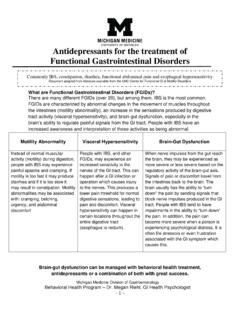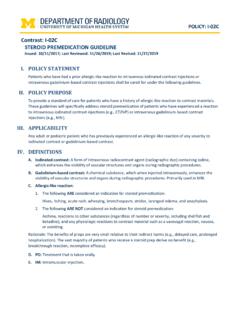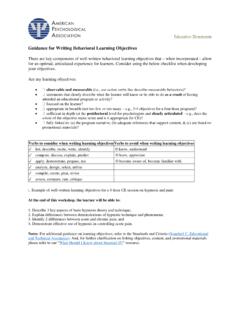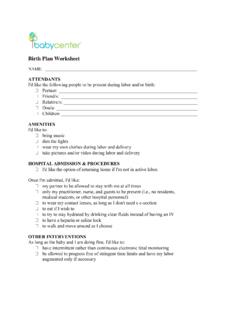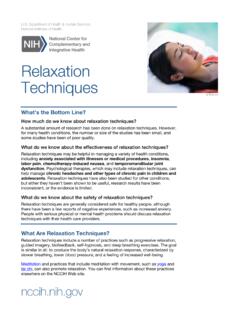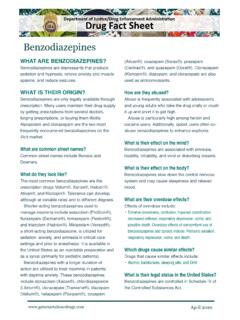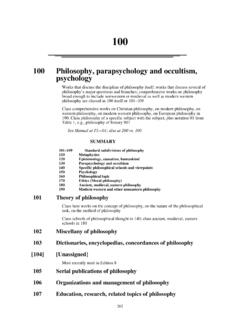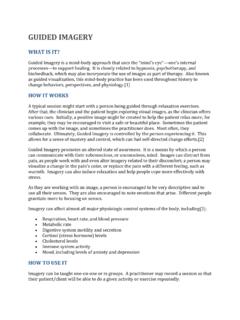Transcription of Antidepressants for Functional Gastrointestinal Disorders
1 Antidepressants for the treatment of Functional Gastrointestinal Disorders Michigan Medicine Division of Gastroenterology Behavioral Health Program Dr. Megan Riehl, GI Health Psychologist - 1 - What are Functional Gastrointestinal Disorders (FGIDs)? There are many different FGIDs (over 20), but among them, IBS is the most common. FGIDs are characterized by abnormal changes in the movement of muscles throughout the intestines (motility abnormality), an increase in the sensations produced by digestive tract activity (visceral hypersensitivity), and brain-gut dysfunction, especially in the brain s ability to regulate painful signals from the GI tract.
2 People with IBS have an increased awareness and interpretation of these activities as being abnormal. Motility Abnormality Visceral Hypersensitivity Brain-Gut Dysfunction Instead of normal muscular activity (motility) during digestion, people with IBS may experience painful spasms and cramping. If motility is too fast it may produce diarrhea and if it is too slow it may result in constipation. Motility abnormalities may be associated with: cramping, belching, urgency, and abdominal discomfort People with IBS, and other FGIDs, may experience an increased sensitivity in the nerves of the GI tract.
3 This can happen after a GI infection or operation which causes injury to the nerves. This produces a lower pain threshold for normal digestive sensations, leading to pain and discomfort. Visceral hypersensitivity can happen in certain locations throughout the entire digestive tract (esophagus to rectum). When nerve impulses from the gut reach the brain, they may be experienced as more severe or less severe based on the regulatory activity of the brain-gut axis. Signals of pain or discomfort travel from the intestines back to the brain. The brain usually has the ability to turn down the pain by sending signals that block nerve impulses produced in the GI tract.
4 People with IBS tend to have impairments in the ability to turn down the pain. In addition, the pain can become more severe when a person is experiencing psychological distress. It is often life stressors or even frustration associated with the GI symptom which causes this. Brain-gut dysfunction can be managed with behavioral health treatment, Antidepressants or a combination of both with great success. Commonly IBS, constipation, diarrhea, Functional abdominal pain and esophageal hypersensitivity Document adapted from literature available from the UNC Center for Functional GI & Motility Disorders Michigan Medicine Division of Gastroenterology Behavioral Health Program Dr.
5 Megan Riehl, GI Health Psychologist - 2 - Why are Antidepressants used to treat FGIDs, like IBS? Some medications have more than one benefit in treating medical problems ( aspirin for headaches AND/OR to prevent heart attacks). While Antidepressants were created for the treatment of depression, research has shown them to be effective as analgesics (drugs to reduce pain). Antidepressants are now prescribed to some patients with chronic pain conditions such as fibromyalgia, migraine headaches and diabetic neuropathy. Similarly, Antidepressants are effective in treating symptoms associated with FGIDs.
6 People who have used Antidepressants for their IBS, report significant improvement in abdominal pain as well as a reduction in diarrhea, constipation, bloating, nausea and urgency. How do Antidepressants work for FGIDs? The brain is constantly monitoring and processing all that is happening in the body. Antidepressants are known to work at the level of the brain and spinal cord to block pain messages between the GI tract and the brain, thereby reducing visceral hypersensitivity. In essence, there is recovery of more normal brain-gut functioning, possibly by helping the brain send down signals to block incoming pain impulses.
7 Similar to treating diabetes with insulin that is missing, Antidepressants may help recover the brain s ability to response to pain signals properly. Certain Antidepressants can help regulate abnormal bowel functions, as well as other IBS symptoms. Tricyclic Antidepressants (TCAs) help with diarrhea, serotonin reuptake inhibitors (SSRIs) help with constipation, and serotonin-norepinephrine reuptake inhibitors (SNRIs) can help with visceral pain. Research has shown that Antidepressants may stimulate nerve cell growth and possibly restore more normal nerve functioning in the brain and intestines over time.
8 Therefore, your provider may recommend medication treatment for 6 months to 2 years before tapering off. Also, when taking an antidepressant you should take the medication consistently for at least 6-8 weeks before expecting symptom improvement. If you receive no benefits from the medication after 6-8 weeks, speak with your provider. When to take Antidepressants for IBS? People with mild IBS symptoms do not typically need Antidepressants . Other behavioral health or medical treatments may control symptoms. People with moderate to severe IBS may benefit from antidepressant medication management alone or in combination other treatments.
9 Doses typically begin low and can gradually increase if needed. These low doses are usually not at a therapeutic dose to manage depression or anxiety. If you are experiencing psychological/ emotional symptoms as well, you should work with your provider to ensure medication is dosed appropriately. Michigan Medicine Division of Gastroenterology Behavioral Health Program Dr. Megan Riehl, GI Health Psychologist - 3 - TCAs SSRIs SNRIs Other amitriptyline (Elavil) imipramine (Tofranil) desipramine (Norpramin) nortriptyline (Pamelor) citalopram (Celexa) escitalopram (Lexapro) paroxetine (Paxil) sertraline (Zoloft) fluoxetine (Prozac) venlafaxine (Effexor) duloxetine (Cymbalta) desvenlavaxine (Pristiq) milnacipram (Savella) bupropion (Wellbutrin) mirtazipine (Remeron) trazodone (Desyrel) hyoscyamine (Levsin)* dicyclomine (Bentyl)* Alosetron (for diarrhea, IBS-D)
10 * linaclotide (for constipation, IBS-C)* Possible Side Effects: Dry mouth, difficulty sleeping, trouble urinating, sexual difficulties, constipation, dizziness, drowsiness Nervousness, vivid dreams, sleep disturbances, sexual difficulties, diarrhea Nausea, headache, changes in liver chemistry tests (rare), cardiac complications *medication acts directly on the GI tract Common concerns associated taking with Antidepressants : Many people fear that medications will be addicting or will alter mental functioning. These medications are not addicting and do not cause changes in your personality or your thinking.



